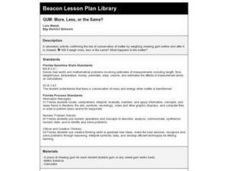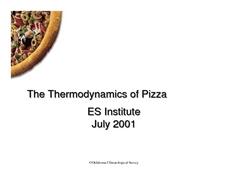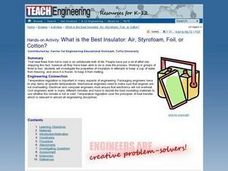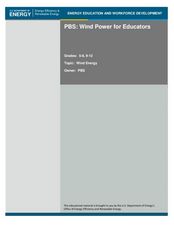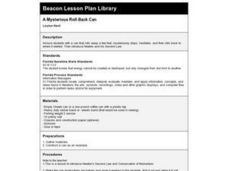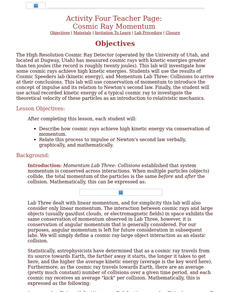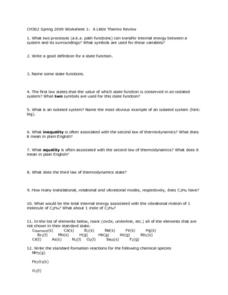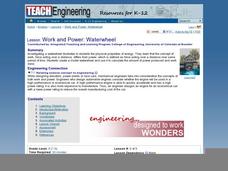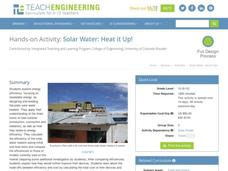Curated OER
GUM: More, Less, or the Same?
Young scholars confirm the law of conservation of matter by weighing chewing gum before and after it is chewed.
Curated OER
The Thermodynamics of Pizza
Students investigate the laws of thermodynamics. They observe demonstrations of each law, read a summary, and analyze how pizza demonstrates the laws of thermodynamics.
Curated OER
Powering a Green Earth
Students compare and contrast renewable and nonrenewable energy. In this environmental science instructional activity, students discuss the importance of going green. They identify the different components in a power grid system.
Curated OER
Review for Thermodynamics Quiz
In this thermodynamics worksheet, students review kinetic and potential energy, enthalpy, entropy, and standard hear of formation. This worksheet has 1 short answer and 5 problem solving questions.
Curated OER
What is the Best Insulator: Air, Styrofoam, Foil, or Cotton?
Students investigate the properties of insulators by attempting to keep a cup of water from freezing, and once it is frozen, to keep it from melting. They conduct the experiment, record and analyze the results, and answer discussion...
Curated OER
Wind Power for Educators
Students explore wind power as a renewable resource. In this wind power instructional activity students build models of wind turbines and experiment with different changes to see if it increases efficiency.
Curated OER
Scale Models and Wind Turbines
Students determine how to use a scale and the importance of a scale model. In this wind turbine lesson students use a method used to determine the visual impact of wind turbines.
Curated OER
A Mysterious Roll-Back Can
Middle schoolers explore Newton and his Second Law by observing a demonstration involving a can that rolls away, then rolls back to where it started. They construct their own Come Back Can and describe how the cans work.
LABScI
Kinematics: The Gravity Lab
Falling objects can be brutal if you don't protect your noodle! Scholars explore the motion of falling objects through measuring short intervals to determine if the distance traveled varies with time. Building off of this, scholars...
Kenan Fellows
How Much Heat Can a Phase Change Produce?
Scholars learn about heat release in phase changes. They perform calculations as they compare and contrast a science fiction passage and a home heating application.
Curated OER
Cosmic Ray Momentum
Students describe how cosmic rays achieve high kinetic energy via conservation of momentum.
Curated OER
Chemistry Review
In this chemistry overview worksheet, learners review stoichiometry, states of matter, thermochemistry, gas laws, chemical bonding, molarity, chemical equilibria, and kinetics. This worksheet has 41 problems to solve.
Curated OER
A Little Thermo Review
In this thermodynamics worksheet, students define and give examples of state functions. Students review the laws of thermodynamics. Student determine the standard formation reactions for given chemical species. This worksheet has 10...
Curated OER
Cartoons for the Classroom: Conserve More or Drill More?
In this current events worksheet, students analyze a political cartoon about oil drilling and respond to 3 talking point questions.
Curated OER
Work and Power: Waterwheel
Students investigate a waterwheel and the physical properties of energy. For this waterwheel lesson students create a model waterwheel and calculate the amount of power produced.
Curated OER
Bouncing Basketballs
Students discover how the coefficient of restitution is applied to sports by measuring the bounciness of a ball. After examining the mathematical equation that applies to coefficient of restitution, students go to the gym, measure the...
Curated OER
Movement of Objects
Ninth graders investigate motion. In this science lesson, 9th graders conduct experiments on objects to analyze motion and speed. They define motion in everyday life.
Curated OER
May The Force Be With You
Eighth graders investigate Newton's Laws of Motion. They use the example of a roller coaster for illustration purposes. A force associated with a roller coaster is tested, data graphed, and a conclusion is drawn. They use excel in order...
Curated OER
Mini Rockets
Students explore gases. For this chemical energy lesson, students will observer chemical reactions and infer a conclusion about reaction producing gasses.
Teach Engineering
Engineering Brainstorming
Here is a instructional activity that offers a great hybrid of forming new skills and using current knowledge to come up with a plan. The class brainstorms information they would need to know or already know about hybrid vehicles. They...
Teach Engineering
May the Force Be With You: Drag
Do not let friction drag you down! The 11th segment in a series of 22 focuses on the fourth force acting upon an airplane—drag. Pupils learn about the effects and causes of drag.
Virginia Department of Education
Molar Volume of a Gas
What is a chemist's favorite plant? Stoichiome Tree! Scholars produce hydrogen gas by reacting magnesium with hydrochloric acid. Then they calculate the molar volume of the gas produced before answering assessment questions.
Teach Engineering
Solar Water: Heat it Up!
Young engineers are instructed to design and build their own solar water heaters. Then, they calculate the efficiency and cost and compare them to commercially available models. This is a full unit for pupils to apply their knowledge.
Curated OER
Light It Up
Students study day-lighting and other types of light bulbs that are used for energy efficiency. In this engineering instructional activity students study the light bulb parts and the light wavelength.


